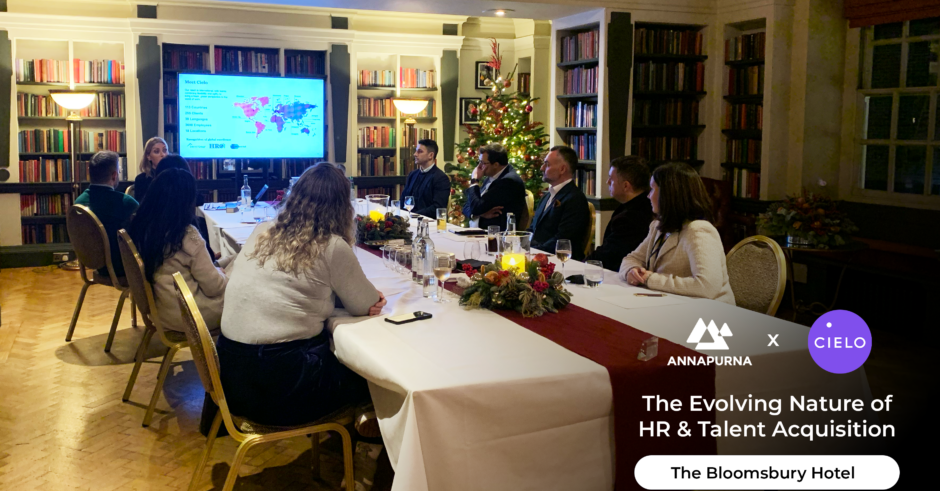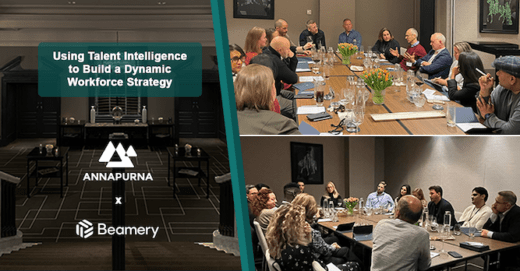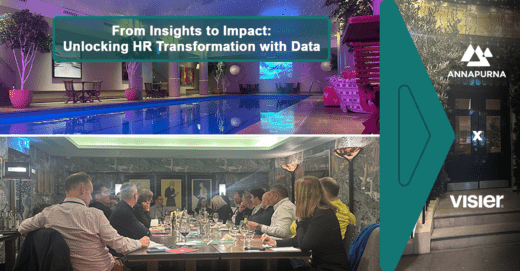The Talent Acquisition function is always evolving and there is further transformation on the horizon. Annapurna recently hosted a roundtable event, in partnership with Cielo, around “The Evolving Nature of HR & Talent Acquisition”. The event, co-hosted by Sally Hunter (Managing Director EMEA & Global Accounts at Cielo) and John Reid (Vice President, Global Client Services at Cielo) was a fascinating conversation with a select group of Executive People leaders which focused around Cielo’s recent survey insights on future HR/Talent Acquisition trends spanning 2023-2026+.
The discussion around GenAI reflected its prominence in the minds of participants. However, there is a collective acknowledgment that navigating the terrain of GenAI is still a learning process. The TA function most definitely requires an element of adaptability to fully leverage the advantages of increased automation but where do we focus our efforts as a priority? The session brought about the following takeaways:
The Continous Evolution of HR Challenges
The discussion delved into the evolving challenges faced by HR professionals in maintaining a prominent role within organisations and the age-old debate about having a seat at the table. The question was asked around, “Will HR stay in the room?” encapsulating the ongoing struggle for HR to retain influence in decision-making forums. The responsibility to navigate and unpick problematic processes emphasises the need for adaptability and a keen understanding of evolving trends. The emphasis on the role of automation highlights the delicate balance required for effective implementation, ensuring that the human touch is not lost in the pursuit of efficiency. Additionally, the call to build communities of talent reflects the recognition that traditional distinctions between employees and candidates are blurring, necessitating a more holistic and community-oriented approach to talent management.
AI and Workforce Planning
GenAI, representing the amalgamation of AI and automation, took center-stage in the discussion, raising critical questions about its ethical use and the inherent biases within AI systems. The challenges of using AI in executive hiring underscores the need for a cautious approach, considering the ethical implications and the potential for biases in decision-making. The conversation delved into the additional inevitable biases present in every system and questioned the rationale behind deploying AI. The complexity of workforce planning and the reliance on AI tools for sourcing candidates present a dynamic landscape where the intersection of technology and human judgment requires careful consideration. Understanding the potential and pitfalls associated with the integration of AI in HR and talent management was the overarching theme here with the group concluding that market research and industry benchmarking around the role of AI in their environment was a definitive step one.
Remote Work and Talent Management
The impact of remote work on talent retention became a focal point in the conversation, highlighting the need to reevaluate traditional approaches to culture and employee engagement. Remote work, in the context of a skills deficit, prompted a consideration of the effects on promotions and the challenges of managing a team in dispersed locations. There was a distinct tension around the desire for remote work flexibility and the importance of in-person interactions in fostering a strong organisational culture. The conversation around mental health and well-being further enhanced the importance of understanding the diverse needs of a remote workforce. The evolving nature of talent management in the context of remote work and the need to strike a balance between flexibility and creating a connected, supportive work environment has never needed more time and effort dedicated to it.
The roundtable highlighted the pivotal role that AI/Automation will plan in shaping the future of HR and Talent Acquisition, yet showed the delicate nature of the ongoing learning curve in navigating this transformative landscape. We must continue to emphasise the need for TA to evolve with flexibility in embracing increased automation. The collective commitment to staying at the forefront of industry trends signals a dynamic and forward-thinking approach within the HR community.
Cielo recently interviewed over 250 senior HR executives to discover how HR professionals globally are preparing for change and how to adapt to the future of HR. You can view the free report here.



